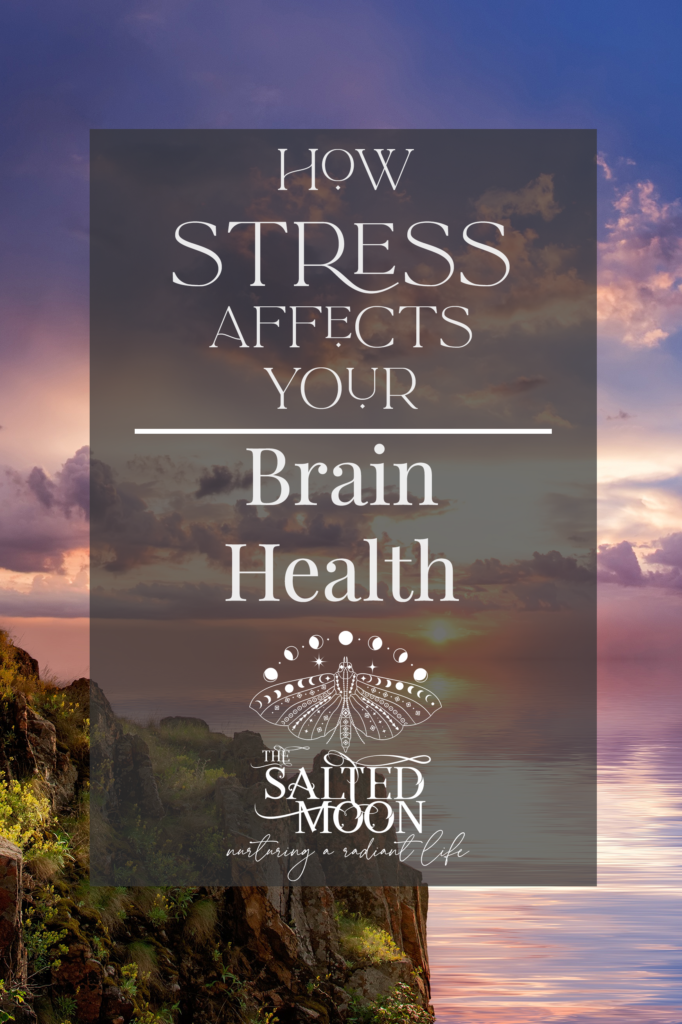If you want robust cognitive function, it’s vital to understand how stress affects your brain health.
Just imagine for a moment, your extraordinary, delicate, yet powerful brain actively keeping your body humming, your consciousness pondering, your memories remembering, and firing neurons like a self-contained universe you lovingly carry around cocooned in your head.
Then imagine stress shaking it up like a toddler with a snow globe, knocking things over, creating cracks, and letting the flaky goodness leak all over the floor.
Dramatic, sure. Yet, stress affects your brain in ways not too unlike this visualization.
Our brains not only initiate movement, interpret our world, and orchestrate our emotions and behaviors but embody the essence of who we are—mind, body, and soul. Like me, I know you want to keep our brains flourishing until our last breath.
We have to get a grip on stress to protect our brains.
Not all stress, of course. So, let’s examine what kind of stress affects your brain health and what you can do to reduce the damage.
Good Stress Affects Your Brain
I don’t know how my mom survived my dancing days. I loved to dance. But when it was time to go on stage, I’d become an inconsolable bundle of nerves. “I can’t do it. I can’t do it!” Talk about severe stage fright.
I thought I’d keel over and faint. Yes, the middle-school me even thought I could die from the fear. And all the while, my mom had to encourage me to get on stage. If I were my mom, I would have given up.
The ironic part is that within a few 8-counts, I was in heaven. I loved performing. Loved it. I’d come off stage in an absolute natural high and couldn’t wait until next time. Until next time.
I know.
I was a handful.
Although my mom might disagree, performance anxiety is good stress. Good stress sharpens your awareness, gives your muscles extra energy, and helps your body remember complex choreography. I always knew that if I were on stage, I’d have the extra oomph to make the moves happen, even if they weren’t perfect in practice.
When we experience what might be called good stress, the wiring in our brains react by building more robust networks and greater resilience. As a result, we can better take on challenges and perform tasks that although might make us anxious—like performing before an audience or starting something new—and it also helps us learn more and grow.
Bad Stress Affects Your Brain
If we stay in a heightened stress state and struggle to regain homeostasis—the stable, balanced equilibrium condition our body thrives in—then we create damage.
Often it goes undetected, eating away little by little, damaging in small doses deep within our systems so that we don’t recognize the damage. Or signs like headaches, digestion issues, aches, and pains, seem to be a side effect of life and the connection goes unnoticed.
When the stress state is activated, and the restorative state is not allowed to do its job, we start to see troubles with sleep, immunity, and our mood and behavior. In addition, if our brain is continuously involved in protecting us from danger (stress), then it has little energy left to do the crucial functions of organizing and storing memories, building strong neuropathways, and keeping the rest of our systems in harmony.
Yikes! But let’s back up and talk about how this all begins.
How Your Brain Processes Stress
You’ve probably heard of the “fight, flight, or freeze” response, but here’s a quick rundown.
Your autonomic nervous system is constantly tip-toeing between the sympathetic (fight or flight) mode and the para-sympathetic (eat, breed, rest) mode.[1] Ready to fight off any danger or to get you out of trouble, or allow you to relax and let your body do its digestive, breathing, and repairing business.
Your senses interpret incoming signals as a possible threat and alert your brain’s fear center, resulting in a surge of follow-up reactions thanks to the sympathetic nervous system, SNS. Danger = stress.
That’s a possible threat. So, it may be the dumbass on a cell phone running a red light and almost hitting you. Or, it could be a long-held fear of abandonment if you aren’t good enough.
A threat alarm increases your breathing and heartbeat speed, dumps sugar into your bloodstream, and adrenaline and cortisol, among other hormones, begin surging.
When the threat, danger, or stressor has subsided, your parasympathetic nervous system, PSNS, comes on duty, and your body returns to a more balanced state for restoration, digestion, and peace.
Chronic Stress Affects Your Body
Everything that happens to you—body, mind, and spirit—is intertwined. While you may have heard how chronic stress affects your body, it’s essential to take a moment to refresh your memory. Everything that affects your body will eventually affect your brain.
Cortisol
Cortisol is necessary as it helps your body access energy stores to cope with stress, like getting up in the morning. So a surge of cortisol is handy to get out of bed. This is good.
But, if cortisol levels remain too high for too long, your immune system is affected. Your immune system gets used to high levels, slows the production of white blood cells, and inflammation takes over. This is not good.
High levels of inflammation are linked to many conditions and diseases and impact every cell in your body. Here are a few:
- Depression
- Increased body fat
- Increased appetite
- Arthritis
- Fibromyalgia
- Lupus
- Psoriasis
- Type 2 diabetes
- Heart disease
- Cancer
- Inflammatory bowel disease
- Asthma
- Cognitive decline
- Brain degeneration
- Alzheimer’s
And, yes, that is not an exhaustive list. See those last ones? Yikes.
Cardiovascular
A strong relationship exists between your cardiovascular system health and your brain health. If you suffer elevated blood pressure and heart rate (when your SNS is chronically engaged), you increase your susceptibility to heart attack, stroke, hypertension, high cholesterol levels, and inflammation. (Yep, once again. Connected to the above problems.)
Digestion
All those excessive hormones rushing through your body and preparing your body for fight or flight leave your digestion in limbo. Without good digestion, you can’t get the nutrients your need, but this dump of blood sugar takes a toll on your gut health.
Your gut is your second brain. As your gut health deteriorates, your brain health deteriorates. Research shows a correlation even if it isn’t entirely understood. For example, too much stress without relief causes acid reflux, diarrhea, constipation, nausea, and upset stomach. The long-term damage to your gut microbiome is also related to inflammation. You know the drill from here.
Mood
Anxiety, depression, addiction, and other mood disorders are strongly interwoven with chronic stress. As mentioned above, stress overload interferes with sleep, messing up your moods, and is a factor in obesity. If you don’t get enough sleep, you have less self-discipline and are less likely to exercise and more likely to eat more.
And the snowball tumbles down the mountain, becoming an avalanche of imbalance and weakness, opening the door to disease and sickness.
How Stress Affects Your Brain
Okay, so the universe of you is a complex, dynamic mixture of body, mind, and spirit. What happens in one realm of your being affects what happens in every other area. No part of you is separate. But let’s look at what it does directly to your brain health.
Memory Loss
If you’re rushing out the door to leave and suddenly can’t remember where you put your keys, you’re experiencing a short-term memory problem. When your body fights off a threat, you don’t need these short-term memories (actually, you might need your car keys, but your brain doesn’t know that), so it makes sense these go. Instead, your brain energy focuses on getting you out of trouble.
If you are always in a state of alert, your brain won’t have the energy to process memories, and it jeopardizes your long-term memories as well.
Brain Structure
Gray and white matter make up your brain. Gray matter is in charge of higher-order thinking tasks such as decision-making and problem-solving.
White matter connects the different areas or regions of your brain and communicates information back and forth, and produces myelin (the white sheath that surrounds axons of nerves, thus the white of white matter).
When the SNS is activated, the white matter goes crazy, building new myelin sheaths, which isn’t bad until chronic SNS activation counters by producing fewer gray matter neurons.
Chronic imbalance isn’t healthy, and permanent structural damage can occur. Imbalance affects hippocampus function. Memory consolidation and transfer, learning, emotion, spatial memory, self-awareness, compassion, and introspection are all seated in the hippocampus.
Chronic stress can shrink the actual size of your brain—sometimes seen in people with post-traumatic stress disorder or those suffering from unrelenting underlying stressors.
Even if it doesn’t change your brain’s volume, low-grade, continuous stress makes it difficult to handle an intensely traumatic experience like the death of a loved one, divorce, a move, or other life-changing events.
Brain Cells
The hippocampus is also one of only two places that create neurons. And not only does stress often kill new neurons, but the new neurons that manage to survive are also less hearty and tend to die more quickly.
Cheerleader Moment
Especially as we enter our second half, we must work on reducing the wear and tear of stress and focus on the growth and nurturing of our brains. I have a post here about how movement nurtures brain health. The quickest way to calm a frazzled mind is through diaphragm breathing. It can be done anywhere, at any moment, so check this out for the nitty gritty.
We don’t know the magical cure-all, and science doesn’t understand everything we need to know, but we understand enough. But, the measures we can take to support our cognitive and brain health are simple enough and have enough benefits aside from just brain food that it is worth the effort to make these changes.

[1] I don’t know why I get the names of these two systems twisted around—a lot. In fact, even when I wrote this post, the first draft, I had them backward. But, I think I finally found a mnemonic to remember. P = peace. R = rest. PaRasympathetic is the peace and relaxation mode. I hope that helps you as it did me.



